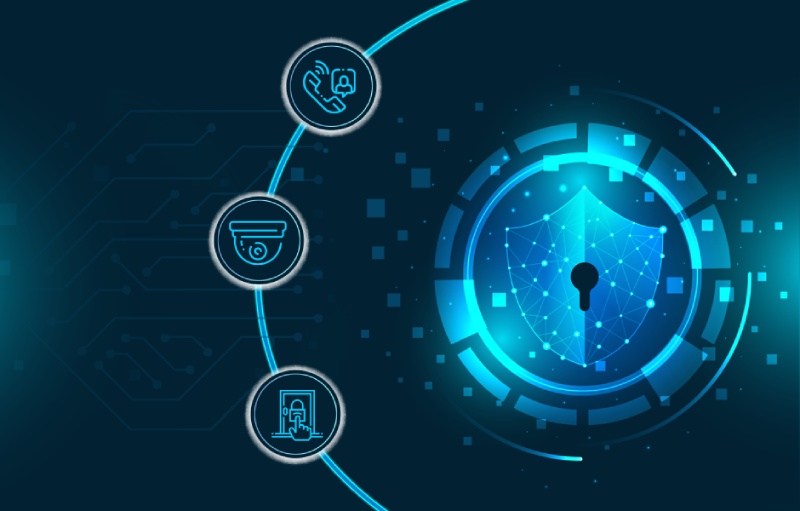Bridging the Atlantic: How German Tech Innovations are Bolstering U.S. Security Systems

In an era of technological advancements, international collaboration, and heightened security concerns, cross-country partnerships are key in improving the safety of citizens.
One such partnership that highlights the importance of such a relationship is between the United States and Germany. With a shared commitment to global security, they are paving the way for more robust and resilient defense mechanisms.
Germany’s technological innovations have become a vital bridge across the Atlantic, enabling the United States to implement even stronger security systems. Often lauded for its engineering prowess, the country has witnessed its tech giants making significant strides in bolstering U.S. security.
Simon Strobel is the CEO of ESRA, a company specializing in security and surveillance technology, communication technology, and alarm systems.
He says: “German industrial automation and digitalization has developed cutting-edge security solutions that protect critical infrastructure in the United States.”
Strobel adds that by partnering with U.S. agencies, companies like Siemens have fortified the nation’s power grids, transportation systems, and water treatment facilities against cyber threats: “Using this kind of technology can be used to ensure the continuity of essential services even in the face of digital attacks.”
Strobel cites Bosch, another German conglomerate, as being at the cutting edge when it comes to bolstering US security: “It has channeled its expertise in IoT (Internet of Things) technology to advance security systems,” he says.
He adds: “Their innovative solutions, which incorporate machine learning and artificial intelligence, have been integrated into U.S. smart cities’ surveillance networks, making them more efficient and responsive in detecting and mitigating security risks.”
This partnership between Bosch and U.S. municipalities has resulted in safer urban environments for millions of Americans.
With over 14 years of experience in security and surveillance camera installations, Strobel has been dedicated to conceptualizing solutions that enhance safety.
His own company Frogfish, which has a base in Saint Louis, Missouri, specializes in importing and exporting security and surveillance systems, bridging the gap between Europe and North America.
He has forged close relationships with a network of high-level US professionals and political figures to support the exchange of important security information and technologies.
Strobel received an invitation from the Missouri Partnership program to establish his business in Missouri, forging partnerships with Governor Michael Parson and visiting the Capitol in Jefferson City, Missouri.
Ambassador Norman T. Scharpf also invited Simon to a reception at the American Embassy in Frankfurt, Germany.
Strobel says leveraging expertise in cloud computing has played a pivotal role in modernizing U.S. security systems: “By using this kind of software, it is possible to streamline operations, enhance data management, and make data-driven decisions.”
One example is the collaboration between SAP and the U.S. Department of Defense, which has revolutionized military logistics.
Through the implementation of SAP’s supply chain management software, the U.S. armed forces have achieved greater efficiency and accuracy in their logistics operations, ensuring timely delivery of crucial supplies to troops worldwide. This technological advancement has not only bolstered national security but also contributed to the well-being of service members.
However, Strobel adds the partnerships between the United States and Germany extends beyond the private sector, with both nations actively collaborating on cybersecurity initiatives.
The Federal Office for Information Security (BSI) in Germany has established strong ties with the United States’ Cybersecurity and Infrastructure Security Agency (CISA). By exchanging intelligence and coordinating responses, they enhance the resilience of critical infrastructure on both sides of the Atlantic.
Strobel adds: “There are also several joint projects between U.S. and German universities, as well as research institutions, which have led to the creation of advanced encryption algorithms and threat detection technologies.”
In addition to safeguarding sensitive government data, these innovations also safeguard citizens’ digital privacy on both continents.
As the world enters the era of quantum computing, Germany and the United States are again at the forefront of technological innovation.
Quantum computing promises to revolutionize cryptography, rendering many existing encryption methods obsolete.
Strobel says recognizing these potential security risks, Germany and the United States are collaborating on quantum-resistant encryption standards that will ensure the confidentiality and integrity of sensitive data in the post-quantum era: “German companies like IBM Germany and Fraunhofer-Gesellschaft have made substantial investments in quantum computing research.”
He adds: “The aim is to harness the power of quantum machines to benefit national security.”
Strobel believes collaborations between Germany and the United States are a testament to the strength of transatlantic partnership: “It will remain a cornerstone of global stability and resilience, bridging the Atlantic for a safer, more secure future.”
Stefan Süppel is a mechanical engineer and mentored Strobel as part of the IVCG International Community of Christian Businessmen.
He says: “Simon is empathetic and listens to what you say regarding a business problem. He will look at it from every angle to give you the best advice possible. He sets milestones in his business and isn’t afraid to stop a project if necessary, and he isn’t afraid to make tough decisions.”
Describing Strobel as “dedicated and hardworking”, he adds: “Simon is incredibly knowledgeable about his business. He also has a great capacity to develop new ideas and make them work to improve a business.”